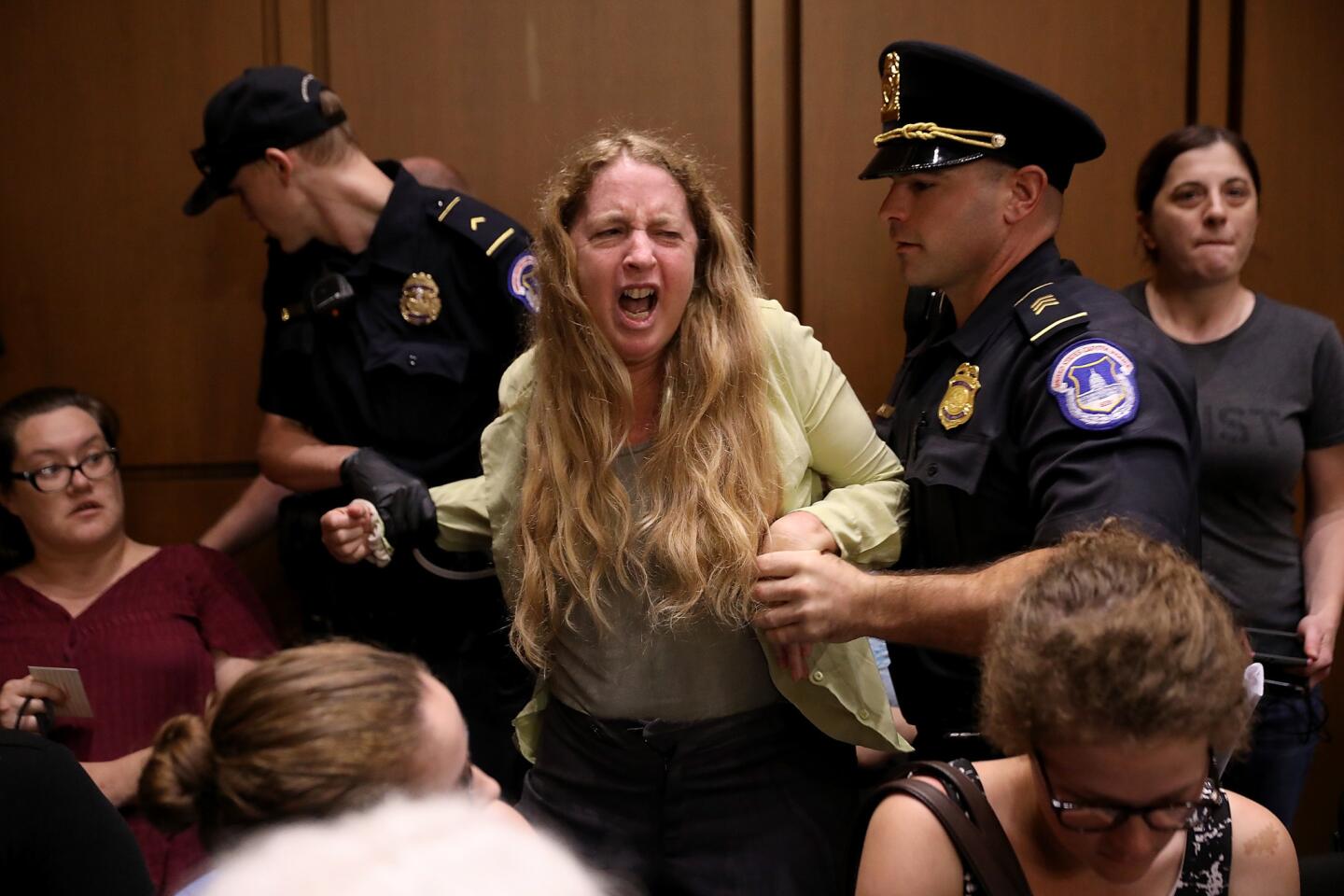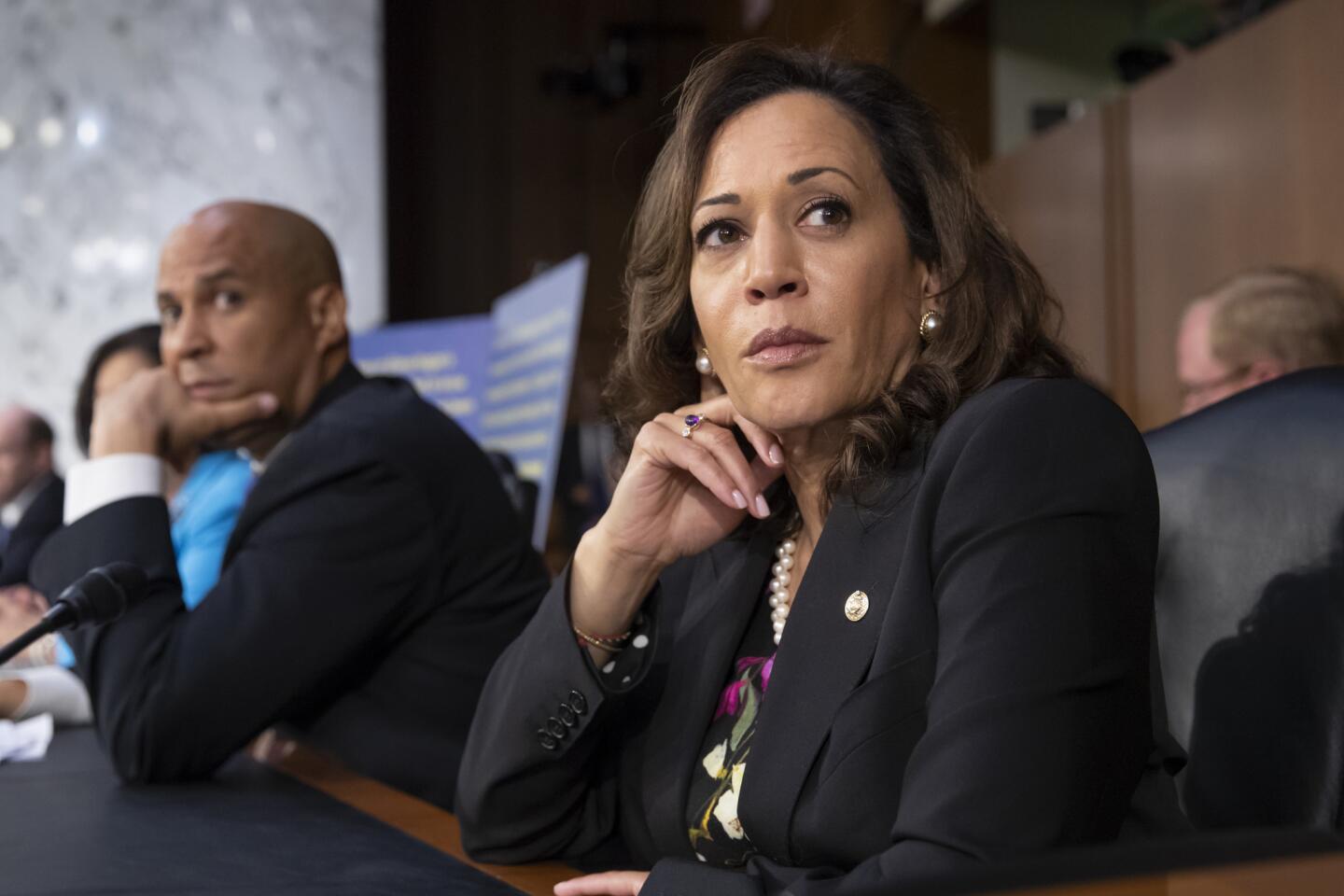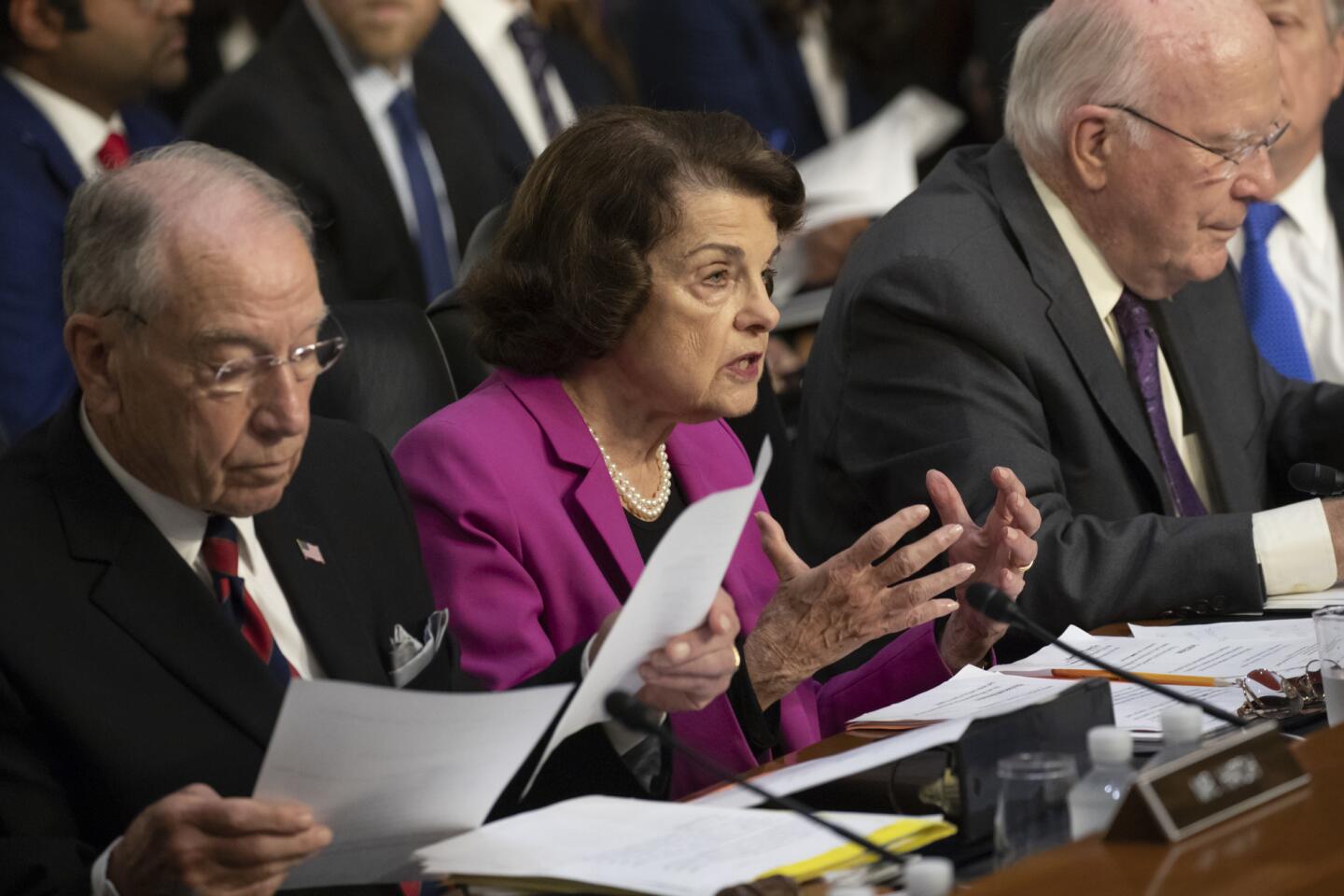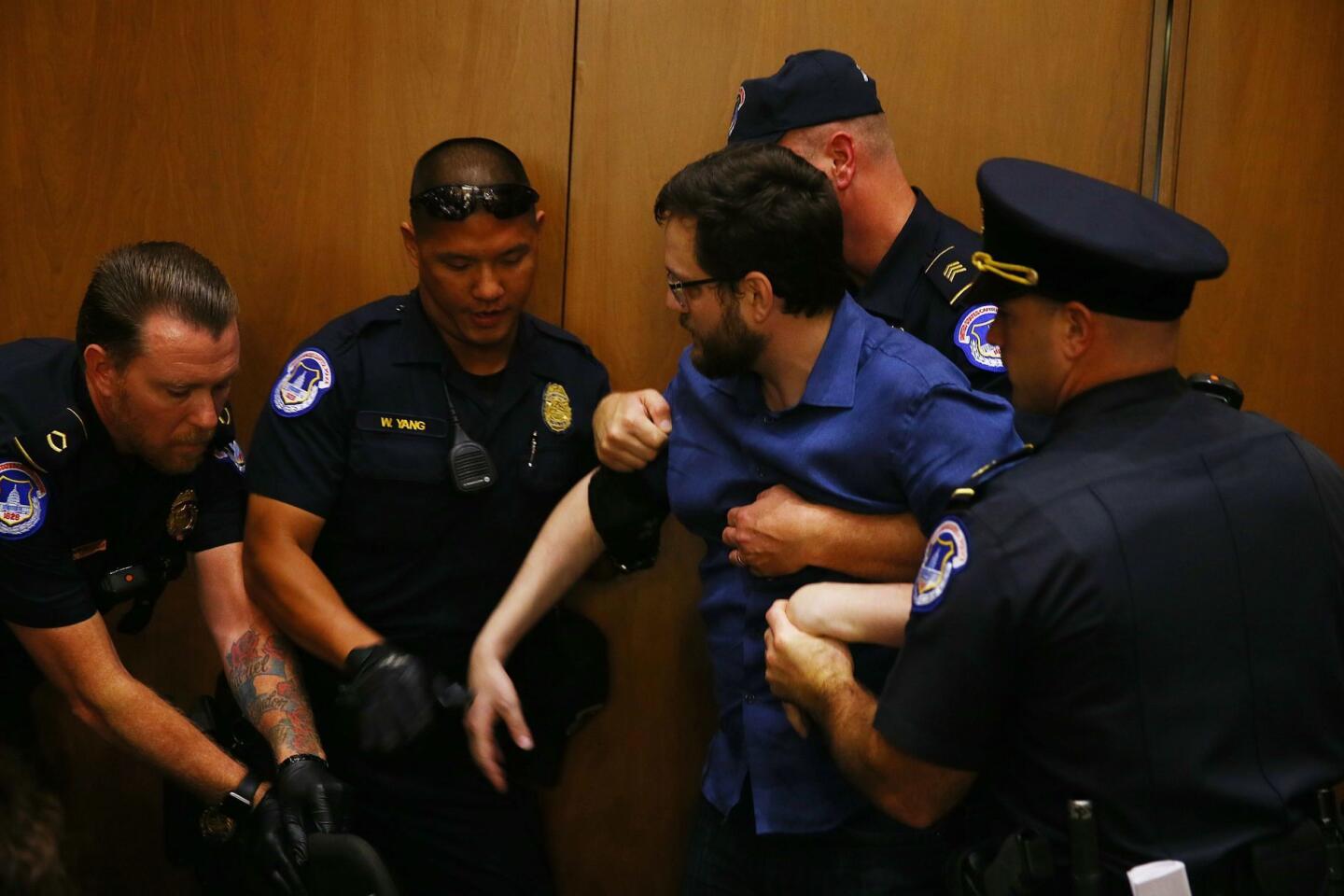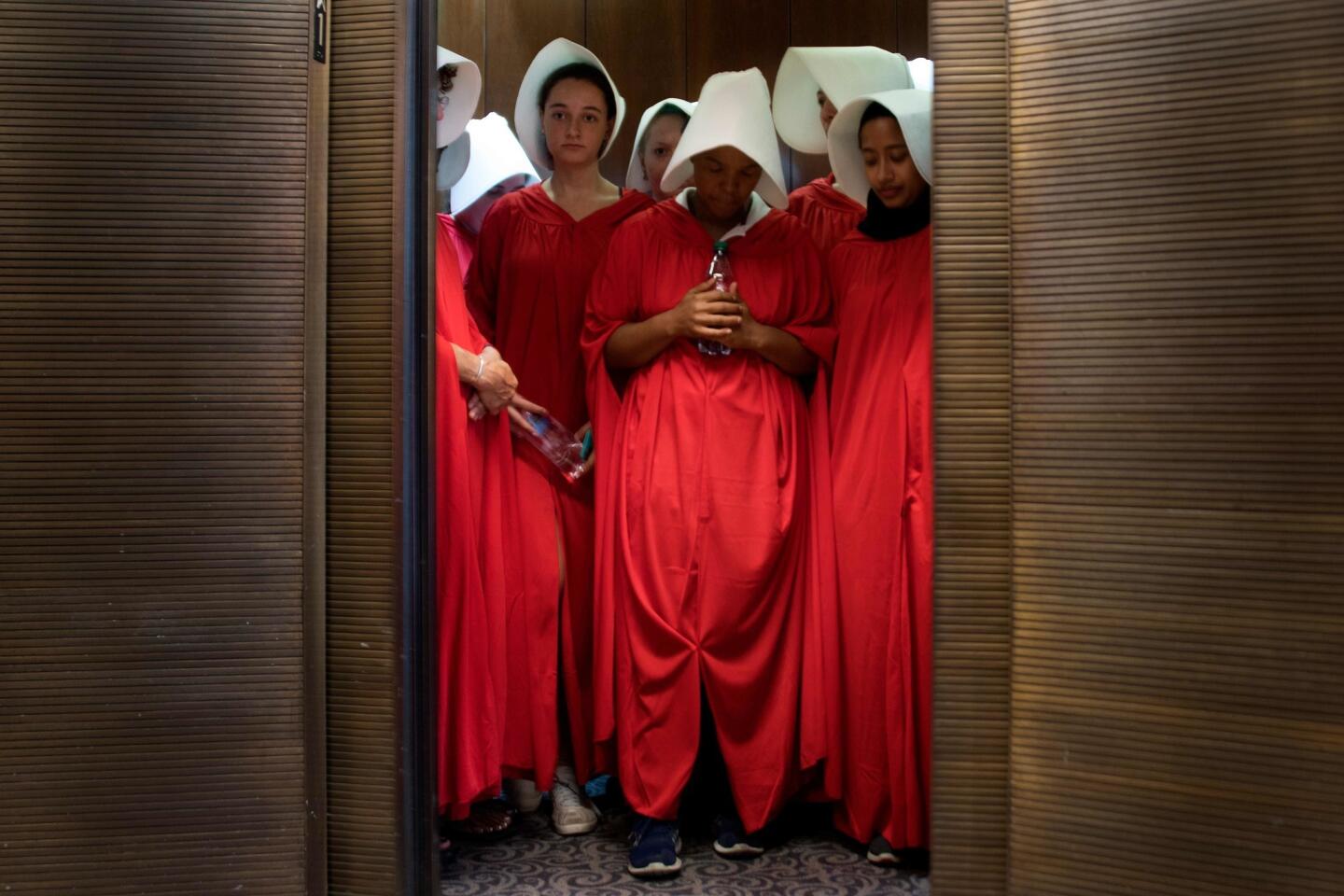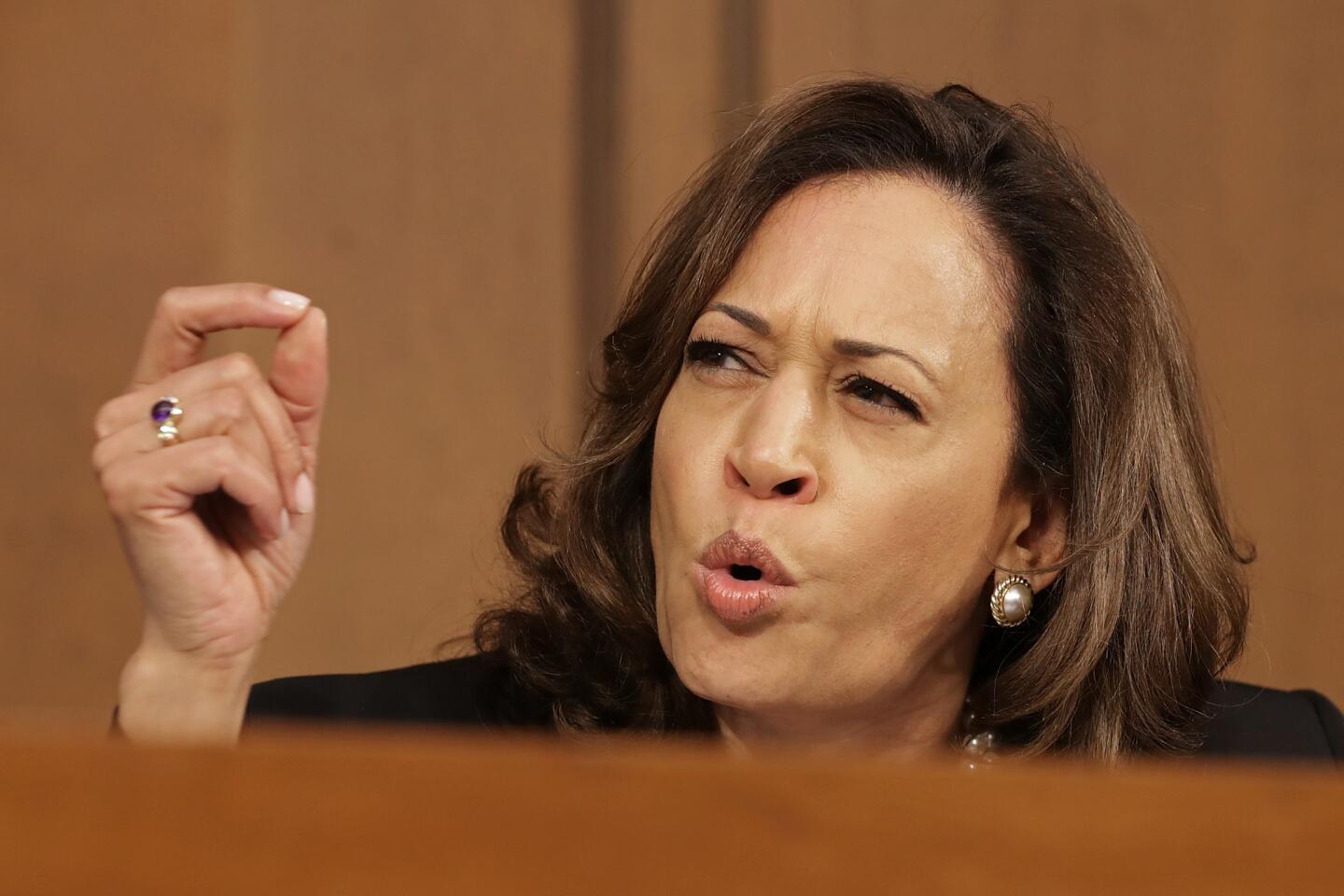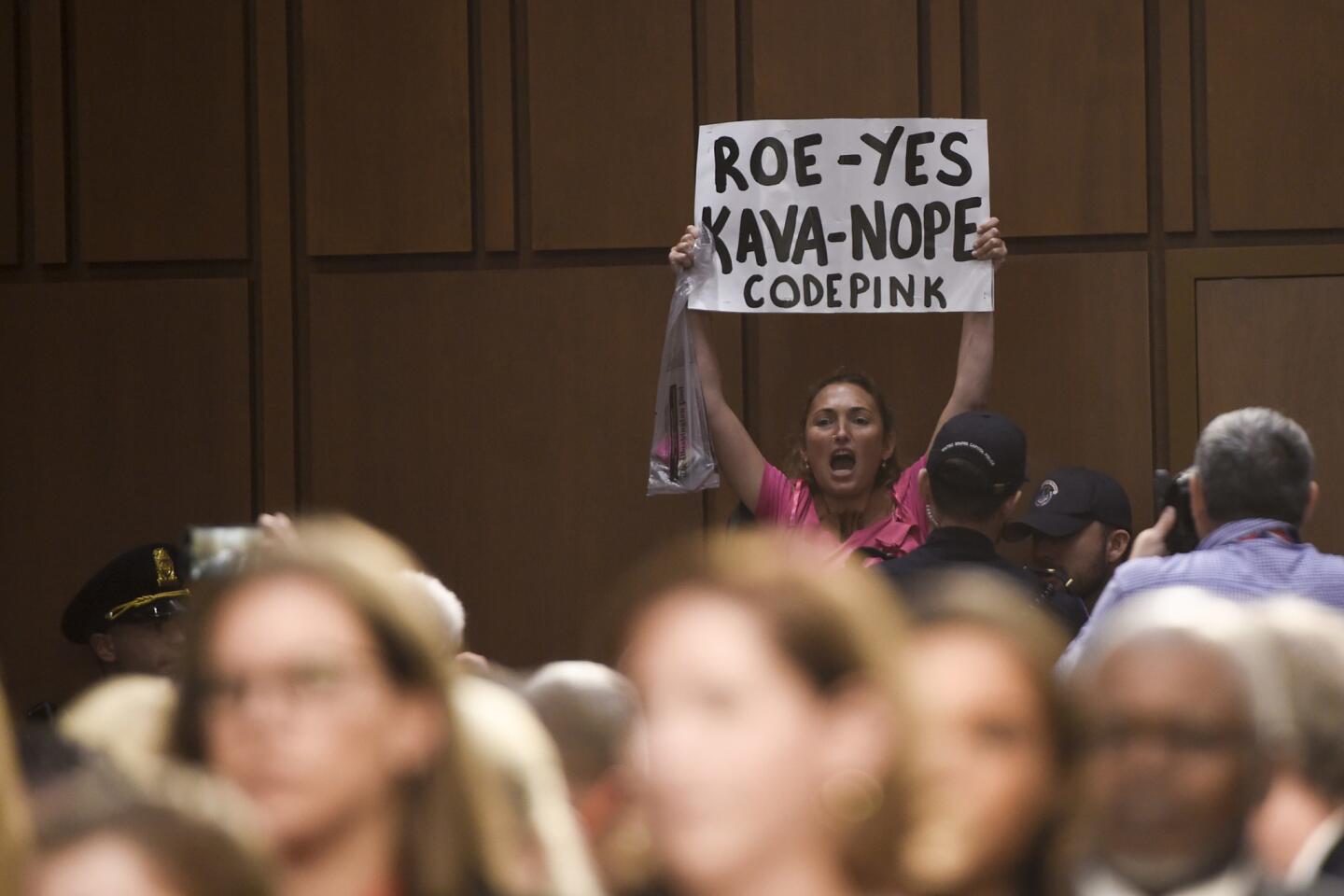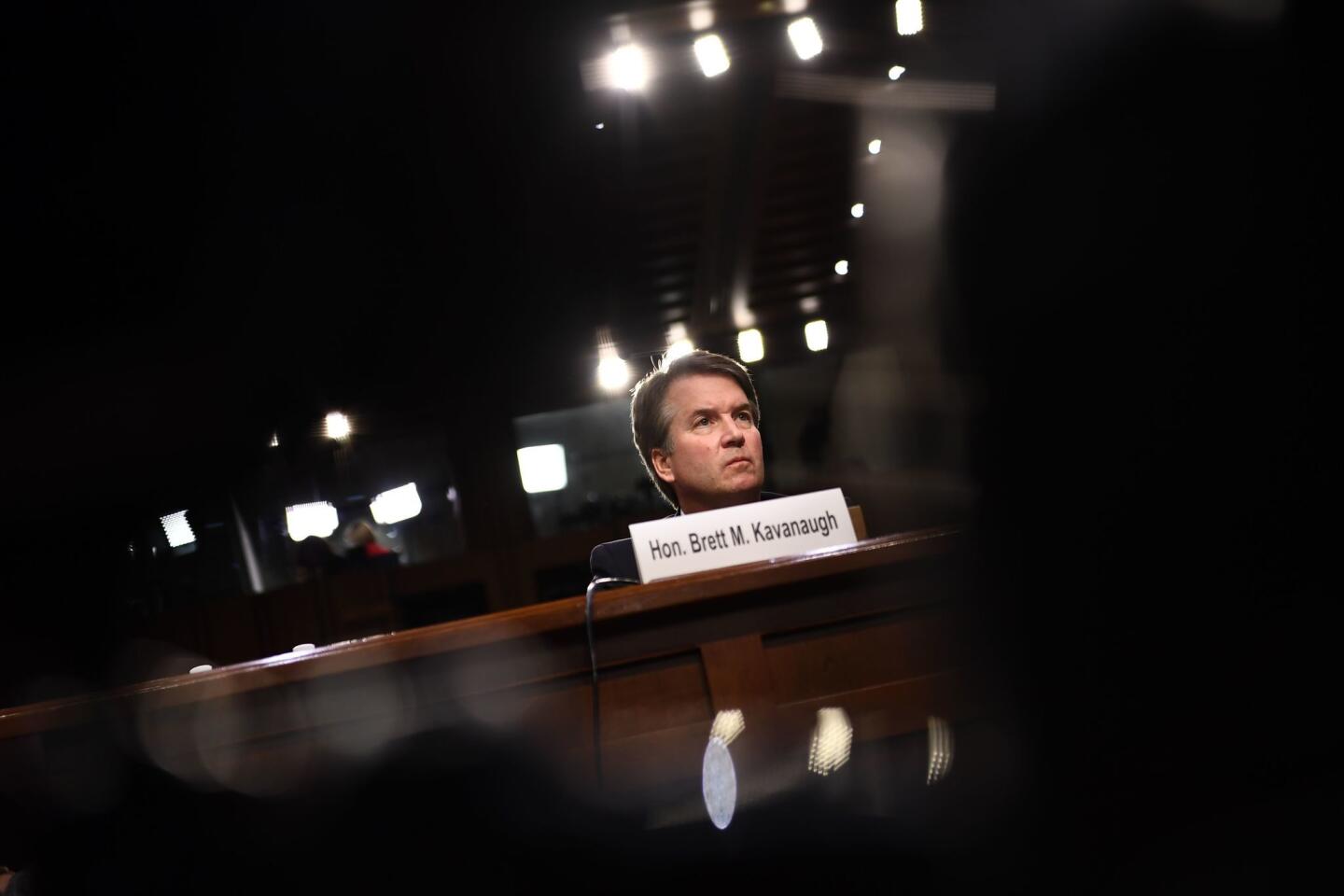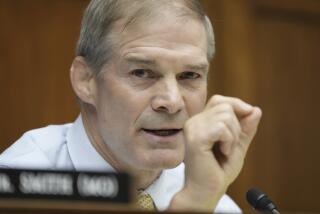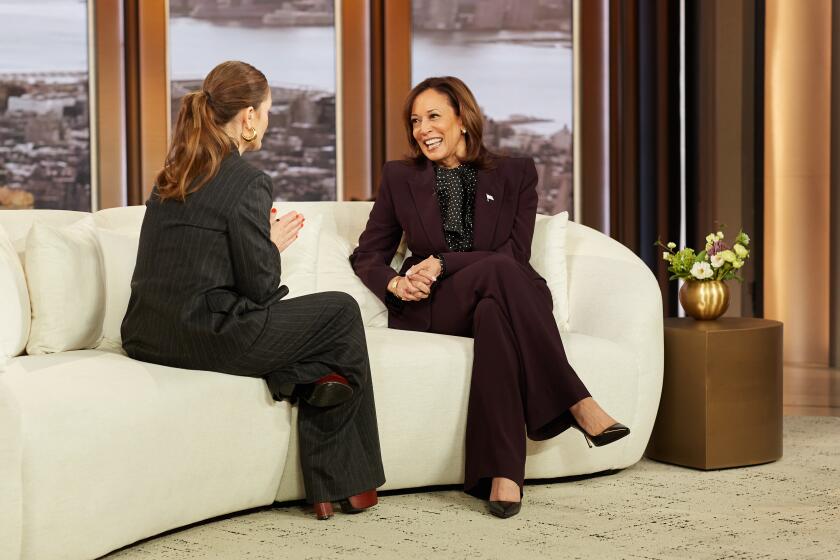Kavanaugh’s Supreme Court hearing gets off to a combative start as Democrats protest the process

Supreme Court nominee Judge Brett Kavanaugh’s confirmation hearing had a rough start as Democrats and protesters tried to shut it down.
Democrats made clear Tuesday that the confirmation hearing for Brett Kavanaugh, President Trump’s Supreme Court nominee, will not go quickly or smoothly, though the chances of blocking his appointment in the GOP-led Senate remain slim.
The session started as confirmation hearings usually do, with Senate Judiciary Committee Chairman Charles E. Grassley (R-Iowa) trying to introduce the nominee and his family. But almost immediately, California Sen. Kamala Harris led other Democratic members in launching an unprecedented protest for a Supreme Court confirmation hearing, repeatedly interrupting Grassley with requests to suspend or adjourn.
Grassley eventually got the hearing back on track, albeit 80 minutes late. And by the end of the day, Kavanaugh was able to be sworn in to make his opening statement, where he spoke emotionally about his family, friends, volunteer work and commitment to the law.
“If confirmed to the court, I would be part of a team of nine, committed to deciding cases according to the Constitution and the laws of the United States. I would always strive to be a team player,” Kavanaugh said.
But the noisy, chaotic start set the tone for what will probably be a contentious four or five days of hearings. By the end of the first day, more than 70 protesters had been arrested for yelling and disrupting the proceeding, making it the most confrontational Supreme Court confirmation hearing in recent memory.
Republicans rushed to Kavanaugh’s defense and accused Democrats of playing politics with the nomination.
“If you want to pick judges for your way of thinking, then you better win an election,” Sen. Lindsey Graham (R-S.C.) told Democrats.
It was a far more antagonistic hearing than the one held just last year, with Trump’s first nominee, Neil M. Gorsuch. The change speaks to both the decline in civility during Trump’s second year as well as the importance of the vacancy at issue. The replacement for Anthony M. Kennedy, who retired earlier this year, could cast a deciding vote in determining whether to restrict abortion, end affirmative action and rein in environmental regulators.
Though they currently lack the votes to stop Kavanaugh’s confirmation, Democrats are hoping to increase public pressure on Republicans by portraying the process as hurried and unfair, and Kavanaugh as an unusually partisan nominee chosen by a president who is under criminal investigation.
“In reviewing this nominee’s background, I am deeply concerned that what guides him is not independence or impartiality. It’s not even ideology,” said Harris, who delivered one of the most stinging rebukes of Kavanaugh.
“It is clear that the nominee has brought his political bias to the bench,” she said. “He has carried out a conservative, partisan agenda as a judge, favoring big business over ordinary Americans, polluters over clean air and water, and the powerful over the vulnerable.”
Harris and other Democrats also suggested that Kavanaugh might use his vote on the high court to protect Trump.
Republicans insisted the opposite was true — that Kavanaugh could be trusted to fairly follow the law, and not his political beliefs.
“At the end of the day, I think all of us know Brett Kavanaugh understands his job isn’t to rewrite the laws as he wishes they were,” said Sen. Ben Sasse (R-Neb.). “His job is to be fair and dispassionate. It is to follow written laws. Judge Kavanaugh doesn’t hate women and children … and doesn’t lust after dirty water or stinky air.”
In his opening statement, Kavanaugh — who played a lead role in the investigation that led to President Clinton’s impeachment and later worked in the George W. Bush White House — did not directly respond to the Democrats’ complaints. But he did speak of the need to insulate the high court from politics.
“The Supreme Court must never, never be seen as a partisan institution,” he said. He also repeated a sports metaphor that Chief Justice John G. Roberts Jr. used in his confirmation hearing. “A good judge must be an umpire — a neutral and impartial arbiter who favors no litigant or policy.”
But public opinion polls suggest the high court increasingly is seen as partisan and political.
Democrats were frustrated by the refusal by Republicans and the Trump administration to release tens of thousands of pages of documents that might reveal more about Kavanaugh’s role as a lawyer in the Bush White House, particularly concerning his views about torturing terrorism suspects.
“What is being hidden?” asked Sen. Patrick J. Leahy (D-Vt.), a former committee chairman.
Sen. Richard J. Durbin (D-Ill.) noted that Kavanaugh was in the Bush White House when it opposed an anti-torture amendment sponsored by the late Sen. John McCain. After the bill was passed by an overwhelming margin, “President Bush issued a signing statement asserting his right to ignore the law that John McCain had just enacted. Yet we have been denied any documents disclosing your role or your advice to President Bush,” he said.
Much of the assault was led by Harris and other Democrats on the committee who are viewed as potential 2020 presidential candidates, including Sens. Cory Booker (D-N.J.) and Amy Klobuchar (D-Minn.). This week’s confirmation hearings will give them an opportunity to raise their national profiles.
But despite the confrontation and political theatrics, there were no signs that Republicans were wavering in their support for Kavanaugh.
And they got a little more wiggle room Tuesday when Arizona Gov. Doug Ducey announced the appointment of Jon Kyl, a retired three-term U.S. senator, to fill McCain’s seat. That means Kyl, who guided Kavanaugh in his visits to senators this summer, will be seated in time to vote on his nomination.
With Kyl, Republicans would once again have a 51-49 majority in the Senate. Even if they lose one GOP vote, Vice President Mike Pence would be available to break a tie. And Senate vote counters say at least a few Democrats from conservative states may vote for Kavanaugh.
Democrats used their opening statements to continue the assault on what they say has been a rushed process.
Democrats were responding to the White House’s decision Monday to withhold about 100,000 documents concerning Kavanaugh’s past work at the White House. Democrats had originally requested millions of pages of documents.
Late Monday night, more than 40,000 new pages were released. Democrats complained that did not give them enough time to review them.
Booker said senators have not been able to review as much as 90% of Kavanaugh’s record. “I would not buy a home seeing only 10% of the rooms,” he said.
Leahy noted that William Burck, a GOP lawyer and friend of Kavanaugh’s, had screened the documents. “This is the most incomplete, most partisan and least transparent process I have seen” in four decades in the Senate, he said.
Sen. Dianne Feinstein (D-Calif.), who took a more low-key approach to the hearing than some of her colleagues, said Democrats remain angry over the Republican-led Senate’s refusal in 2016 to even hold a hearing for President Obama’s high court nominee, Judge Merrick Garland.
“You have to understand the frustration on this side of the aisle,” said Feinstein.
Grassley dismissed Democrats’ complaints, noting that Kavanaugh was a judge for 12 years, during which time he wrote more than 300 opinions. And Grassley said twice as many government documents have been released about Kavanaugh than any previous nominee.
Sen. John Cornyn (R-Texas) complained the hearing had taken a turn toward “mob rule.” This “pandemonium” is “unlike anything I have seen at a Supreme Court hearing,” he said, suggesting that if Democrats were in a courtroom, their actions would be enough to be held in contempt.
This is “the noise of democracy,” responded Durbin. “It is not mob rule.”
Tuesday’s session included only opening statements from the senators and Kavanaugh. Questioning will begin Wednesday.
About 70 people were escorted from the committee room by Capitol Police for protesting and disrupting the hearing. Among other things, the protesters yelled about the need to protect preexisting medical conditions under Obamacare and the right to abortion. Kavanaugh is expected to provide the fifth vote on the court to restrict abortion rights and possibly overturn the landmark ruling Roe vs. Wade.
Most protesters left peacefully and began their interruptions with “excuse me” or “with all due respect.” Others screamed at the top of their lungs, waved homemade signs and thrashed when police officers escorted them out. At times, Grassley, even with a microphone, had to shout to be heard over the disruptions.
Trump tweeted Tuesday about the Democrats’ protest: “The Brett Kavanaugh hearings for the future Justice of the Supreme Court are truly a display of how mean, angry, and despicable the other side is. They will say anything, and are only looking to inflict pain and embarrassment to one of the most highly renowned jurists to ever appear before Congress. So sad to see!”
More stories from David G. Savage »
Twitter: DavidGSavage
jennifer.haberkorn@latimes.com
UPDATES:
3:35 p.m.: This article was updated with Trump’s tweet and other comments from senators.
1:05 p.m.: This article was updated with Sen. Lindsey Graham’s comment.
12:50 p.m.: This article was updated with senators’ remarks and additional background.
7:50 a.m.: This article was updated after Sen. Charles Grassley resumed his opening remarks.
This article was originally published at 7:20 a.m.
More to Read
Get the L.A. Times Politics newsletter
Deeply reported insights into legislation, politics and policy from Sacramento, Washington and beyond. In your inbox three times per week.
You may occasionally receive promotional content from the Los Angeles Times.
